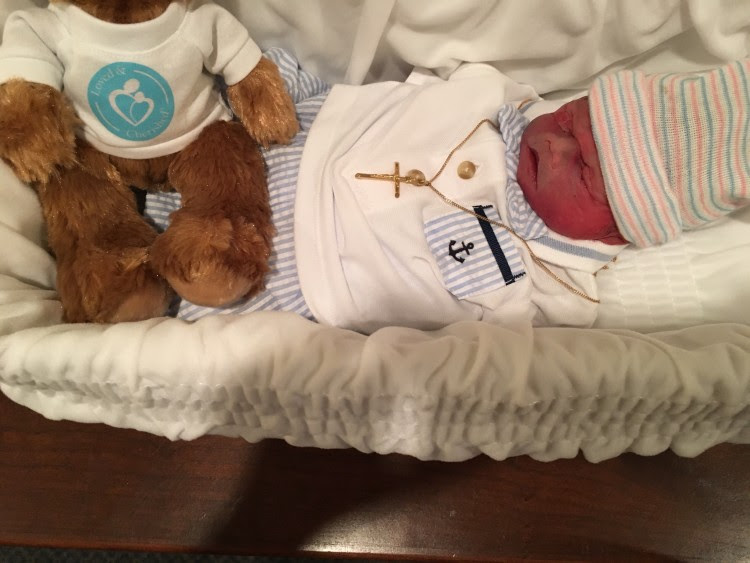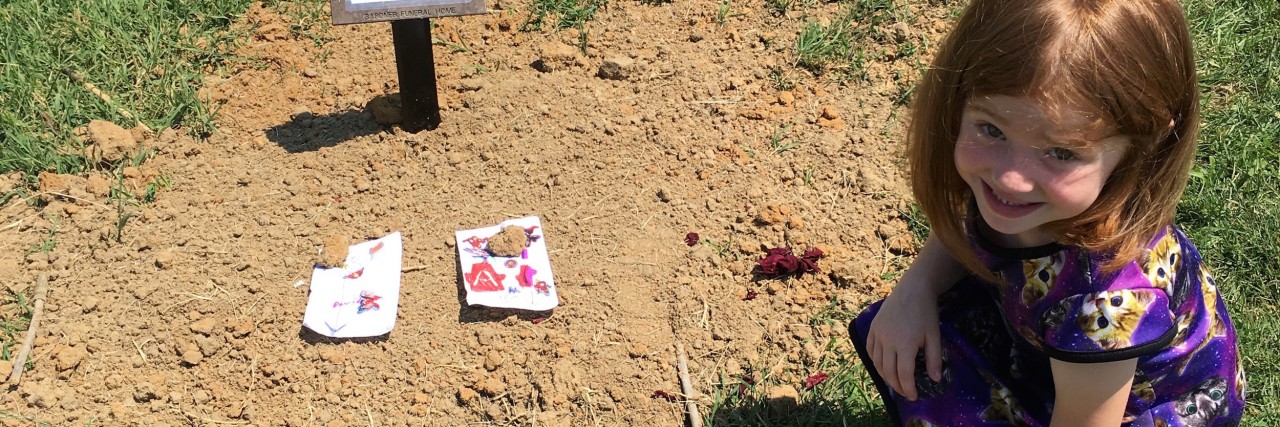When the Doctor Told Me My Son's Underdeveloped Heart Stopped Beating
In March of 2016, one of the scariest and most exciting days of our life was getting ready to unfold. Since finding out that she was going to be a big sister, my 5-year-old Juliet couldn’t wait to find out if she was getting a brother or sister. She told us for weeks that “Jesus told her she was getting a sister.” Part of us wanted to believe her. We all went together to the anatomy ultrasound and waited with excitement to find out that we were in fact, having a little boy. A son was the one thing I had always wanted out of life and it looked like my dream was coming true.
The ultrasound tech told me I could go empty my bladder and he would be right back. After coming back from the bathroom, all three of us gushed about how amazing it was going to be to have a little David in our lives. But, suddenly, the obstetrician came into the room with the ultrasound technician. “There is something wrong with the baby’s heart,” the doctor said calmly. After looking at some of the pictures on the screen, the doctor sent my husband and daughter out to the waiting room and put me in a small consult room. Knowing I had been on lithium to control my bipolar disorder, I expected this was something simply fixed by the cardiac team at the local children’s hospital. But when the doctor came in and comforted me stating this defect was not due to anything I had done or any medicine I had taken, I became more nervous. The doctor explained the left side of the baby’s heart was underdeveloped. He called it hypoplastic left heart syndrome (HLHS).
After weeks of fetal echocardiograms and reading medical journals, I was slowly becoming an amateur cardiologist. I began to feel confident that our local children’s hospital, which was ranked 2nd in the nation at the time, would be able to fix up my baby shortly after birth and send me home with my David. I would read other parents’ stories of their heart warriors and just knew that everything would be OK.
In May of 2016, I did the dreaded glucose tolerance test and learned I had gestational diabetes. This didn’t really surprise me but it became a struggle to keep up with blood sugar testing and eating a very limited diet. Because of the diabetes I was called by my high-risk doctor and asked to come in for an ultrasound to check for fluid in the baby’s abdomen (something they referred to as a hydrops check). I did not think much of it and went in for the ultrasound by myself. I was told the baby was “borderline hydropic” and would definitely need frequent monitoring for the remainder of the pregnancy. The doctor was so confident and caring, I called my husband to give him the news without thinking much of it. I told my husband the doctor would like to see me back on June 9. My husband became insistent that I bring someone with me to this appointment, as he would be a few hours away at training for work.
Upon getting home, I called my mother who I knew would be off of work that day. She said she would be glad to come, but later realized she had a doctor’s appointment of her own that day. My husband then phoned his mother, who had always treated me like one of her own children, and she agreed to accompany me. I was more than comfortable with this but could not understand why I needed someone with me. I was still feeling my little Olympic gymnast bouncing around in my belly and found no reason to be concerned.
On June 9, I got through my morning routine as usual and even noticed some turning motions going on in my belly. I drove to my mother-in- law’s house and we talked for a while before leaving to go to the ultrasound. Once there, we waited for just a short period of time before they called us back. The ultrasound technician took a few measurements of the baby’s head, and then moved towards the chest. I knew what the chest was supposed to look like as I had seen numerous fetal echocardiograms of that area. This time it looked different, still, silent. The ultrasound technician announced she was unable to find a heartbeat and was going to get the doctor. My mother-in-law stood next to me and reminded me that I felt him move that morning so he could still be alright. Then, the doctor arrived. He mentioned he believed that the baby had passed away. My mother-in-law and I begged him to double check the ultrasound. Upon trying for a few moments, he stated he was sorry, but there was no heartbeat.


At this time, I was in a state of shock. He was asking me if I had any questions after telling me what the next steps were, but I was unable to answer him. I’m not even sure I heard everything he said. All I knew was I was being taken up to labor and delivery and was going to be induced. I remember talking to the doctor about my wishes for a natural birth even though I knew it would take longer than a C-section. I just couldn’t allow myself to go through the painful recovery of a C- section without having a baby to show for it. My mother-in-law called my husband and told him he needed to come to the hospital. A few hours later he showed up, concerned and scared. I labored for two whole days, almost to the exact hour. I can’t even begin to count how many nurses I had to convince that I did not want pain medication. It was as if I was going through some penance for not being able to keep him healthy longer. I writhed in pain until I finally allowed someone to give me a small dose of Dilaudid just so I could take a nap. After that nap though, the pain had become what even I considered to be unbearable. I finally broke down and asked to speak to the anesthesiologist to get an epidural. As the nurse was getting ready to go page the doctor, I decided I wanted to use the bathroom first since I forgot “epidural equals catheter.” The only problem was that I couldn’t pee. Luckily my husband had helped me to the bathroom. I recognized what my body was saying and it was screaming, “Time to push!” Then I panicked. I didn’t want to deliver my baby on the bathroom floor, but the concept of walking was no longer something my brain could process. My husband somehow dragged me back to the bed just in time for the doctor to walk in, check my cervix and give me the OK to push.
I eventually delivered David on June 11, 2016. I was 31 weeks along and he came out at 4 pounds even and 16 inches long. He was big for his gestational age. However, he didn’t look real to me. He looked like he was covered in a waxy substance and it was clear that he was not fully developed. It was also abundantly clear that he was completely lifeless. His death was considered a result of his heart defect being too severe.

Then, the worst part came. We were responsible for contacting a funeral home and having him laid to rest. Years ago, I had accompanied my father and his ex-wife to have my brother buried. I remember seeing thepain in their faces and wondering if that same pain was shining through my eyes as we met with the funeral and cemetery directors. We decided on a small “family-only” funeral and had him buried within walking distance of our house. I needed to be able to easily decorate his grave every holiday and visit whenever I felt the need. We had come to notice the grave behind David’s was that of a little girl who was also stillborn four years prior. There was no formal marker, just the one that the funeral home places until a monument can be made and placed. I wondered endlessly about that little girl’s parents. Were they still alive? Most likely yes. Were they still heartbroken? I couldn’t imagine they wouldn’t be. Was it too painful to purchase a proper headstone? Or could they not afford it? We promised ourselves that once we had David’s placed, we would ask the cemetery director about the other family and see if there was anything we could do to help. Hell, we knew as well as anyone how horrible the whole situation of a stillbirth could be.
Juliet was very accepting of us telling her that her brother had to go to heaven. Within an hour of telling her, she found a penny and used it as a “walkie-talkie” to speak to David. She would tell us in the mornings about the dreams that she had dancing with her brother to Katy Perry music. I would wonder why I didn’t get to have dreams of me holding him and would be somewhat jealous of her youthful innocence.
In the weeks that followed, things started to feel more “normal” during more times of day. Saturdays, however, were like a punch to the face. Was it because he was born on a Saturday and my brain knew that I should be celebrating weekly birthdays? Was it because I finally had another adult in the house and felt comfortable mourning? I tried finding books I could read to walk me through my grief or books that would help my daughter understand the situation better. Not only are these books very rare, but they are also largely out-of- stock in most chain bookstores. Is there such a stigma surrounding miscarriage, stillbirth and infant loss? I couldn’t understand why. Why wouldn’t our society want to help grieving parents? Why wouldn’t our mental health professionals want to do more research or write more books on this topic? Sure, families going through what we have gone through are pretty “rare” in the grand scheme of things, and no pregnant woman wants to think about these awful possibilities. But, those families like mine need a way to process these events and some of them can’t afford a $50 copay for grief counseling but could afford a $20 book from the local bookstore.
There is no right or wrong way to grieve. I know this, because not only have I personally grieved losses many times in my life, but also because every mental health professional I know has told me this. I turned to my faith in God to help me. I would take all of this emotional pain and then some if it meant I’d never have to see a single one of my children struggle, even for a minute.

